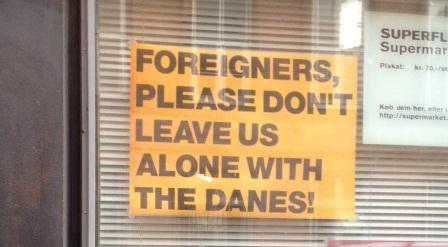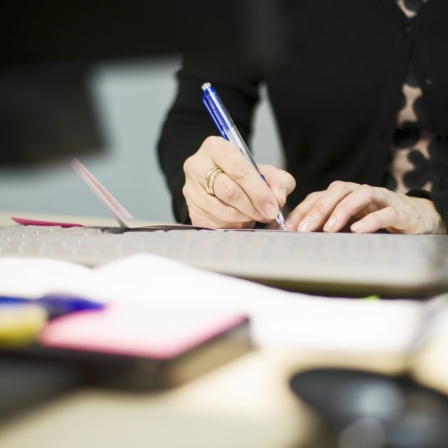The Forum for New Security embarked on a five-day visit to Copenhagen (1-5 December 2013) to view solutions developed in Denmark for new security. In this blog series, the visitors share their inspirations from the trip.
It’s hard to find the right door. We spend some time walking around the courtyard of the apartment building, looking for the entrance. I find myself wondering whether the low profile is intentional, being maintained for security reasons. On the staircase, a young, dark-skinned woman is sitting by the window, holding a baby. She looks as if she knows where we are going. When we get to the stairs, she greets us kindly, with an inquisitive look.
We are in Nørrebro, a stone’s throw away from the centre of Copenhagen. The support centre for immigrant women, Invandrer Kvindecentret, has kindly decided to welcome us, despite our being very different to their usual customers. We thick-set Finns, with our fair skin, blue eyes and affluent lifestyles! Men and women who live on an egalitarian basis! We are hungry for knowledge and full of curiosity, equipped with laptops, smartphones and recording devices, and heavily burdened with prejudices. We are eager to hear about immigrant women’s experiences of personal safety in Denmark.
The centre’s large living room is full of female energy. Its air is warm and thick, as it would be in the aftermath of a wonderful house party. The women have just had lunch together and the atmosphere is relaxed but charged with curious anticipation: Who are these strange visitors? Why are men coming here? Everyone is talking fast. Without understanding the language, I pick up a few familiar words. Finland. They are interested in us, we are interested in them.
I sit next to a woman who has covered her head with a scarf. She is knitting, and we soon find two common means of communication: a universal understanding between people who knit and the English language. She tells me that she is making a knitted cap for her granddaughter, a native Danish girl. The knitting pattern is familiar to me. I once knitted a similar cap for my daughter, a native Finnish girl. The woman tells me she is originally from Pakistan, and came to Denmark in the 1970s. It was difficult for her in the beginning. Shortly before she left Pakistan, she was forced to marry a man she didn’t know, with whom she was supposed to start a new life in a foreign country. Luckily, he turned out to be a good man and we now have three wonderful daughters, she says.
A Lebanese woman, who works in the support centre’s kitchen, agrees to take a short break to tell us her story. I didn’t have a regular childhood, and my teenage years were marked by war, she says. Now life is better. Denmark is a safe country, and people here have respect for others. Still, I miss home and all my loved ones left behind in Lebanon, the woman says. She spent 18 years in Denmark without a job or knowing what to do, but then the social services directed her here. She began by baking chilli and cardamom flavoured cakes for local stores. Now she manages the kitchen and gets down to work as soon as she steps through the door. But even busier times lie ahead. Invandrer Kvindecentret will open a new restaurant in February 2014, and she has been appointed as the manager there. The name of the restaurant is Send More Spice. I hope I can be a role model to others and teach them, she concludes, hurrying back to the kitchen.
Two topics come up more often than any other: work and men. A job – be it part-time or full-time, an internship or an on-the-job training position – not only guarantees a better income, but provides an opportunity to meet other people and boosts one’s confidence. Finding employment for the father or mother of a family supports the integration of all family members into a new country. The centre is planning to assemble a group of 15 or so enterprises that will help lower the threshold for women to find jobs. Concrete support measures are needed, because very few women coming to the centre have been in paid work before. We are told that helping the men is even more difficult. Many men who have immigrated to Denmark live away from their families and are at serious risk of social exclusion. Divorce is common, because it can be difficult for men to adapt to the Nordic countries’ culture of gender equality. The fear is that young boys will radicalise and join gangs, if they are not provided with other, meaningful activities.
After our visit, we have a long discussion about our experiences. Before the visit, we assumed that the experiences of immigrant women would be riddled with fear and insecurity. However, the director of Invandrer Kvindecentret points out that matters of security and safety are not particularly discussed there. Day-to-day life at the support centre is more about women’s daily chores: cooking, child care and teenagers, jobseeking, doctor’s appointments, sewing clothes, knitting, and doing everyday things. A sense of security is built on these small issues. These strong women need nothing special to make them feel secure or at home. They want what everyone else does: reliable and confidential support, someone who stands by them, some spicy food and good company. Assistance with daily chores. Respect. A job. In time, these create a sense of security.
Facts about Invandrer Kvindecentret:
• 10,000 visits per year
• Customers mainly some from Somalia and the Middle East
• Around 150 volunteer workers
• Main funder is the City of Copenhagen, also private donors
•http://www.indvandrerkvindecentret.dk/
Mervi Murtonen, Senior Scientist and Project Manager at VTT Technical Research Centre of Finland




Recommended